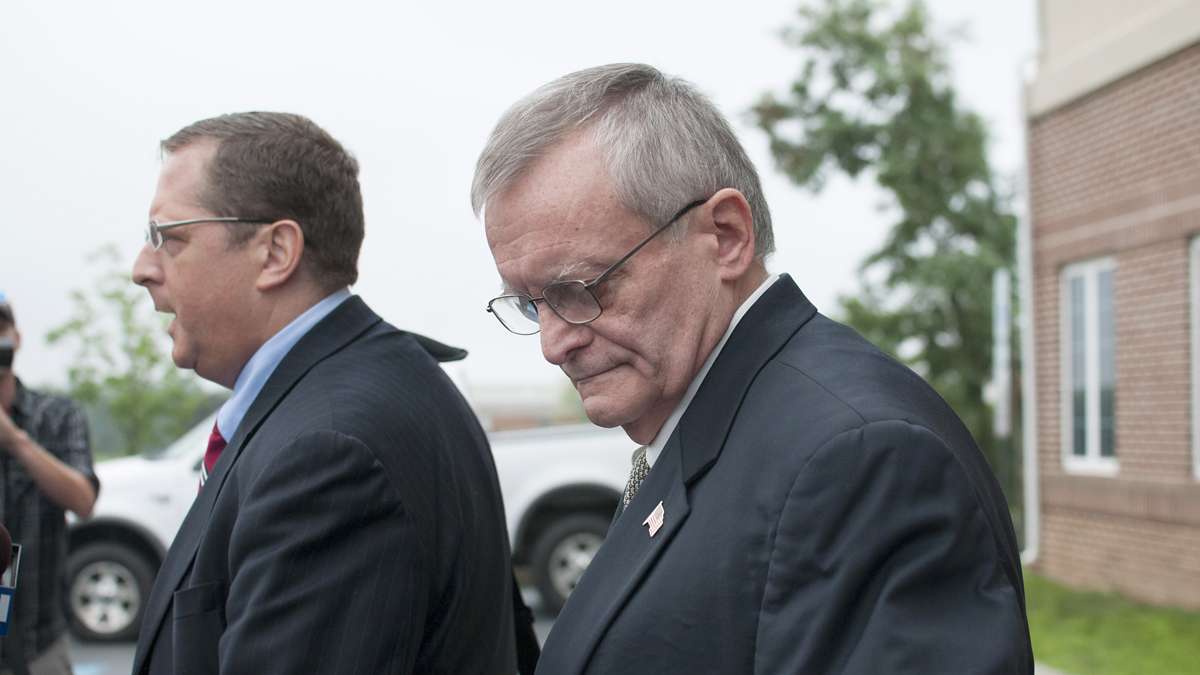How can Pennsylvania prevent cities from fiscal crisis?

File image of former Harrisburg Mayor Stephen Reed (right) and attorney, Henry Hockeimer, in front of a suburban courthouse after being arrested on corruption charges, Tuesday, July 14, 2015. (Diana Robinson/WITF)
A grand jury makes several suggestions in a new report focused on “reckless” financial decisions by Harrisburg officials in the early-to-mid 2000’s.
No more charges out of the second grand jury convened to investigate the near-bankruptcy of Pennsylvania’s capital city.
But the 82-page report does make some recommendations for changing state law:
1. Extend the statute of limitations of public officials in Pennsylvania. Law enforcement already gets extra time to charge public officials, but ambiguity arose during former Mayor Stephen Reed’s trial over when the clock starts. Read the details here. The bottom line, according to the grand jury: change or clarify the law so it’s the longer of the competing interpretations of current statute.
2. Empower the state Attorney General’s office to independently initiate investigations of local officials. Currently, the state AG’s investigators only get local corruption cases if they’re referred by a county prosecutor who’s spotted a conflict of interest. In this case, that process took more than a year. Dauphin County District Attorney Ed Marsico’s initial stated intentions were to investigate the case. But after more than a year, Marsico’s office handed it over to then-state Attorney General Kathleen Kane. Kane’s own scandals became increasingly distracting throughout the Harrisburg case, which also went through three lead prosecutors in as many years.
3. Limit the number of appointed board spots one person can hold. The grand jury noted that Reed, who served seven terms as mayor after stints in the statehouse and as County Commissioner, stacked boards with his allies — some holding multiple seats simultaneously. This let him “control the actions of those boards. In effect, they became his alter ego,” according to the report.
4. Restrict local officials and employees’ ability to move between the public and private sectors. Pennsylvania gets low marks by some good government groups, and its laws limiting movement between state and private employment are no exception. But even those relatively weak rules don’t apply at the local level. That should change, the grand jury found.
5. Require companies to post a performance bond in order to secure public contracts. Before Pennsylvania law changed in 1990, performance bonds had to be for the full value of the contract. A performance bond would’ve “shielded Harrisburg from the financial fallout from the failed contract to retrofit the incinerator,” the grand jury report noted. Senate Bill 493 would establish this mandate, but it hasn’t moved at all since being introduced March 10. It’s part of a four-bill package aimed at preventing municipal financial crises. Similar measures have been introduced during the last two legislative sessions. There was little, if any, movement on the original measures, and subsequent watered-down version didn’t do much better last session.
6. Require public bidding for professional services, and simplify related state law so it’s consistent among municipalities.
7. Step up the state’s review of public debt issuances. The grand jury called for better vetting by the state Department of Community and Economic Development and giving DCED the authority to reject submissions that don’t have the proper paperwork backed up by a review of someone with appropriate expertise. One issue with expanding DCED powers, in particular, has to do with staffing: the department’s funding has been reduced drastically in recent years. Senate Bill 491 would establish new record retention requirements for the department and adds filing requirements for issuers without identifying funding for the additional workload. SB491 also clarifies fiduciary responsibilities of those involved in the deals and would make the process leading up to the borrowing more transparent.
Sponsors of SB491 and the three other related measures are considering amendments or additional bills to reflect recommendations in the grand jury report, according to Lee Derr, chief of staff for state Sen. John Eichelberger.
Editor’s note: This post was updated to add the paragraph above.
WHYY is your source for fact-based, in-depth journalism and information. As a nonprofit organization, we rely on financial support from readers like you. Please give today.



